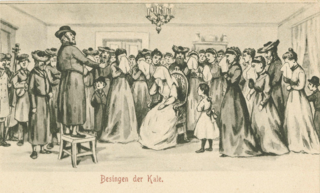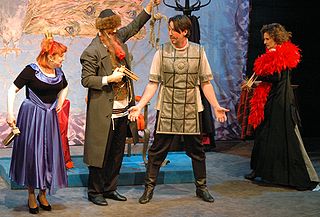Related Research Articles

Klezmer is an instrumental musical tradition of the Ashkenazi Jews of Central and Eastern Europe. The essential elements of the tradition include dance tunes, ritual melodies, and virtuosic improvisations played for listening; these would have been played at weddings and other social functions. The musical genre incorporated elements of many other musical genres including Ottoman music, Baroque music, German and Slavic folk dances, and religious Jewish music. As the music arrived in the United States, it lost some of its traditional ritual elements and adopted elements of American big band and popular music. Among the European-born klezmers who popularized the genre in the United States in the 1910s and 1920s were Dave Tarras and Naftule Brandwein; they were followed by American-born musicians such as Max Epstein, Sid Beckerman and Ray Musiker.
Yiddish theatre consists of plays written and performed primarily by Jews in Yiddish, the language of the Ashkenazi Jewish community. The range of Yiddish theatre is broad: operetta, musical comedy, and satiric or nostalgic revues; melodrama; naturalist drama; expressionist and modernist plays. At its height, its geographical scope was comparably broad: from the late 19th century until just before World War II, professional Yiddish theatre could be found throughout the heavily Jewish areas of Eastern and East Central Europe, but also in Berlin, London, Paris, Buenos Aires and New York City.

A badchen or badkhn is a type of Ashkenazic Jewish professional wedding entertainer, poet, sacred clown, and master of ceremonies originating in Eastern Europe, with a history dating back to at least the sixteenth or seventeenth century. The badkhn was an indispensable part of the traditional Jewish wedding in Europe who guided the bride and groom through the stages of the ceremony, act as master of ceremonies, and sing to the bride, groom and in-laws with the accompaniment of klezmer musicians. They also had a traditional role on holidays such as Hanukkah or Purim. Today they are primarily found in Hasidic communities.

A Purim spiel or Purim play is an ensemble of festive practices for Purim. It is usually a comic dramatization of the Book of Esther, the central text and narrative that describes what transpired on Purim and why it is celebrated as an important Jewish holiday.

Joel Rubin is an American clarinetist, klezmer musician, ethnomusicologist, and scholar of Jewish music. Since becoming involved in the klezmer revival in the late 1970s, he has been researching, teaching and performing klezmer music and related genres. He has been a member of, or performed with, such groups as Brave Old World, the Joel Rubin Ensemble, and Veretski Pass.
For the purposes of this article, “contemporary” refers to the period from 1967 to the present day, “Jewish” refers to the various streams and traits of Judaism practiced. Many Orthodox Jews use the term “religious” to refer to a strict adherence to Jewish law. For the purposes of this article, “religious” refers to the content and context of the music itself: liturgical or implicit references to the divine.
Yale Strom is an American violinist, composer, filmmaker, writer, photographer and playwright. Strom is a pioneer among klezmer revivalists in conducting extensive field research in Central and Eastern Europe and the Balkans among the Jewish and Romani communities since 1981. Initially, his work focused primarily on the use and performance of klezmer music between these two groups. Gradually, his focus increased to examining all aspects of their culture, from post-World War II to the present. He was among the first of the klezmer revivalists to identify the connection between klezmer and lautare and explore that connection in his scholarly and artistic works.
Daniel Rosenberg is a Canadian journalist and record producer.

Moisei Beregovsky was a Soviet Jewish folklorist, musicologist and ethnomusicologist from the Ukrainian SSR who was a key figure in the study of Jewish music. He collected, studied and published about klezmer music, Yiddish song, wordless nigun melodies, and the music of Purim plays. His published collections, mostly only released after his death, remain important sources of Jewish music from the late Russian Empire and early Soviet period. Most of his research was done during the period of 1927–1949, during the Stalin era, during which he was faced not only with ideological restrictions, but a period of imprisonment in a forced labour camp from 1950 to 1955. He was rehabilitated after 1955 and continued his work in his final years during the Khrushchev-era.
In music, the Ukrainian Dorian scale is a modified minor scale with raised 4th and 6th, and lowered 7th degrees, often with a variable 4th degree. It has traditionally been common in the music of Eastern Europe, Southeast Europe, and the Mediterranean including Jewish, Greek, Ukrainian, and Romanian music. Because of its widespread use, this scale has been known by a variety of names including Altered Dorian, Hutsul mode and Mi Shebeirach. It is also closely related to the Nikriz pentachord found in Turkish or Arabic maqam systems.
Yimakh shemo is a Hebrew curse placed after the name of particular enemies of the Jewish people. A variant is yimakh shemo v'zikhro.

Daniel Kahn & the Painted Bird is a German klezmer band founded by Jewish-American singer-songwriter and actor Daniel Kahn, originally from Detroit, Michigan. The band was formed in 2005 and is based in Berlin. They have released five albums through German world music label Oriente Musik.
The Helen and Stan Vine Canadian Jewish Book Awards were a Canadian program of literary awards, managed, produced and presented annually by the Koffler Centre of the Arts to works judged to be the year's best works of literature by Jewish Canadian writers or on Jewish cultural and historical topics.
Amerike – The Golden Land is a musical with book, lyrics, and song by Moishe Rosenfeld and Zalmen Mlotek. The show is in Yiddish and English depicting the journey of Jewish immigrants to the United States.

"Papirosn" is a Yiddish song that was written in the 1920s. The song tells the story of a Jewish boy who sells cigarettes to survive on the streets. He depicts his tragic fate; having lost his parents, his younger sister has died on the bench, and eventually he loses his own hope.
Anna Shternshis is an Al and Malka Green Professor of Yiddish studies and the director of the Anne Tanenbaum Centre for Jewish Studies at the University of Toronto. Her research interests include Jewish culture in the Soviet Union; Jewish-Slavic cultural relations; Yiddish mass culture, theatre, and music.
Pechora was a concentration camp operated by Romania during World War II in the village of Pechora, now in Ukraine. The concentration camp was established on the gated grounds of what had once been a private estate of the Polish noble Potocki family on the banks of the Southern Bug river, which had been converted into a sanatorium for tuberculosis patients after the Russian revolution.
Eleanor Reissa is an American actress, singer, theatre director, playwright, librettist, choreographer, translator, and author based in New York City. She works and performs in English and Yiddish speaking stages, and also interprets and performs Yiddish theatre and songs.

Alter Chudnover, whose real name was Yehiel Goyzman or Hausman, was a nineteenth century Klezmer violinist from the Russian Empire. He was one of a number of virtuosic klezmers of the nineteenth century, alongside Yosef Drucker "Stempenyu", A. M. Kholodenko "Pedotser" and Josef Gusikov. He was also an early teacher to the violinist Mischa Elman.
Tsen brider is an Eastern-European Jewish folk song written in Yiddish. The original version of the song tells the story of ten brothers, each of whom dies from starvation as the narrative progresses until there is only one left.
References
- 1 2 3 4 YIDDISH GLORY, Six Degrees Records
- 1 2 3 4 5 6 7 8 9 10 "A collection of Yiddish songs was thought lost forever. Now they've been nominated for a Grammy. – Jewish Telegraphic Agency". jta.org. 25 January 2019. Retrieved 26 January 2019.
- 1 2 "The Devastating Resonances of Yiddish Songs Recovered from the Second World War". The New Yorker. 27 July 2018. Retrieved 26 January 2019.
- 1 2 3 4 5 Yiddish Glory: The Lost Songs Of World War II, a YouTube presentation by Six Degrees Records
- 1 2 Eda Beregovskaya "М. Я. Береговский: жизнь и судьба" // Арфы на вербах. – Москва-Иерусалим: Gesharim, 1994.
- ↑ "Slobin on Beregovski (and the survival of Klezmer music), by George Robinson, from the KlezmerShack". klezmershack.com. Retrieved 26 January 2019.
- ↑ "YIVO | Beregovskii, Moisei Iakovlevich". yivoencyclopedia.org. Retrieved 26 January 2019.
- ↑ Petrusich, Amanda (27 July 2018). "The Devastating Resonances of Yiddish Songs Recovered from the Second World War". The New Yorker. Retrieved 26 January 2019.
- ↑ "Anna Shternshis: A Grammy Nomination for 'Yiddish Glory'". Jewish Journal. 20 December 2018. Retrieved 26 January 2019.
- ↑ "The lost Songs Of World War II". Six Degrees Records. 19 January 2018. Retrieved 2 March 2019.
- ↑ Sophie Milman reflects on Yiddish Glory’s Grammy nomination
- ↑ Fifteen-year-old sang on Grammy-nominated album
- 1 2 Perry King, Songs from the past: U of T researcher's work leads to Grammy nomination, University of Toronto News, February 6, 2019